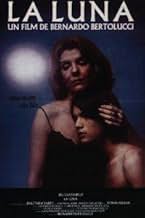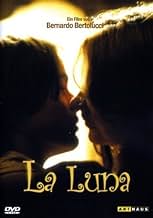IMDb-BEWERTUNG
6,4/10
5581
IHRE BEWERTUNG
Während einer Tournee in Italien hat eine kürzlich bekannt gewordene amerikanische Opernsängerin eine inzestuöse Beziehung zu ihrem 15-jährigen Sohn, um ihm zu helfen, seine Heroinabhängigke... Alles lesenWährend einer Tournee in Italien hat eine kürzlich bekannt gewordene amerikanische Opernsängerin eine inzestuöse Beziehung zu ihrem 15-jährigen Sohn, um ihm zu helfen, seine Heroinabhängigkeit zu überwinden.Während einer Tournee in Italien hat eine kürzlich bekannt gewordene amerikanische Opernsängerin eine inzestuöse Beziehung zu ihrem 15-jährigen Sohn, um ihm zu helfen, seine Heroinabhängigkeit zu überwinden.
- Auszeichnungen
- 1 Gewinn & 2 Nominierungen insgesamt
Mustapha Barat
- Mustafa
- (as Stéphane Barat)
Sara Di Nepi
- Concetta
- (as Shara Di Nepi)
Jole Silvani
- Wardrobe Mistress
- (as Iole Silvani)
Handlung
WUSSTEST DU SCHON:
- WissenswertesThe Italian producers were so outraged by this film's story line that they forbid the director to shoot the film with a local cast and as such the roles played by Jill Clayburgh and Matthew Barry had to be changed to be Americans.
- Zitate
Joe Silveri: Your face is a mess. I'll clean it up.
[starts licking her face]
Caterina Silveri: It's good.
Joe Silveri: Hold still.
- Alternative VersionenAfter being banned in the Canadian province of Ontario. 20th century fox agreed to make cuts to 7 scenes showing incest and the film was given a 'Restricted' rating.
- SoundtracksNight Fever
Composed by Barry Gibb, Robin Gibb and Maurice Gibb
Performed by The Bee Gees
Courtesy of RSO Records Inc.
Ausgewählte Rezension
In a way I feel sorry for Bernardo Bertolucci's La Luna, though maybe more for Bertolucci than the film itself. Having come off of the monumental undertaking of 1900, he probably wanted to still keep the challenging creative juices flowing, and in doing so concocted an idea surrounding a mother and son who lose their closest significant other and go to Rome, only to get dragged into their own created mire of drug addiction, self-absorption, and incest. This, of course, sounds quite meaty dramatically, at least when first heard. Executed on film it's another story, and the final script is probably what ends up making the film one of the weakest- if not THE weakest- I've seen from the director yet.
This still means that there's good chunks in there, even really wonderfully sordid moments of incredible familial dysfunction between mother and son. But unlike, for example, Malle's Murmur of the Heart, there's a lack of cohesion to any sense of firm psychology with either mother or son, and while things are fascinating and potent in dramatic spontaneity in the first two-thirds, there's a moment when things start to go downhill. By the end, I wondered if Bertolucci was about to break into the end of 8 1/2.
We're given a character study, that's for sure, and quite the two f***ed up characters. The mother is Caterina (Jill Clayburgh, a quasi Diane Keaton look-alike, however only sometimes talented and convincing), who's husband (in a great bit part by Fred Gwynne) dies suddenly while driving a car. Though both mother and son are devastated, they go to Rome so she can sing in the opera there. The son, meanwhile, is at that absolutely abhorrent age in anyone's life- 15- and at first is into some nothingness abound with a girl, and soon enough into a dead-end mind-set of heroin.
This alarms her mother, to be sure, and perhaps the most perfect scene of the film (whether this means it will shock or unsettle is another matter), is when the son plays piano for a moment when the mother tries to get her son to tell her about his drug problem, peers for a moment under his shirt, and then he erupts at her with physical violence. Finally it ends, and she goes to one side of the room with a look like 'what the hell just happened', and he goes off to do more junk. There's even the brilliant little insinuation, which is all that's needed, of a notion of desire when she's trying to peer at his arm.
Now, if there had been more scenes like this, consistently, it might even be one of Bertolucci's masterpieces. But, however, this is not to be. Towards the middle things even become shaky, as the same randomness of mind and spirit with the mother and son, this chronic sense of equal parts of nihilism, despair, gallows humor, and the oddness of bourgeois discontent with dark pasts, becomes something that Bertolucci isn't fully able to grab a hold of. And unlike in Last Tango in Paris, there's no Marlon Brando here to make things incredibly appealing with totally believable dread in the face of loss. Matthew Barry is decent in the part of Joe, the son, but also teeters on being annoying (which maybe is part of the desired effect, but still).
And the sense of how their push and pull relationship with his drug addiction as the center isn't fully resolved with the mother. Clayburgh's Caterina just isn't sympathetic, or empathetic, enough to get into her mind-set, because despite being interesting in her part of a somewhat un-fit parent who loves her son perhaps in the worst possible ways, and that both are crazy, it isn't enough to sustain what happens at the 2/3 mark...which is when Bertolucci and his writers pull out the "son, I'll take you back to your roots, and find your *real* father who made you a bastard" card, and everything goes downhill from there.
It's a mark of downhill quality that has almost been building, and it's troubling especially since a lot DOES work in morbid detail of the characters, and how operatic intonations somehow become involved in their plights. But Bertolucci tends to put the hammer down in both technique and substance, and only in the former does it really work. His and Vittorio Storaro's eye in this film is just as sharp and succulent as in their other collaborations, with the camera gliding seamlessly in some crucial ways, providing movement to just the slightest moments of emotional upheaval. Yet even in the least effective spot of the film, there are the moments, like when Joe plays drums with his fork and spoon at the table. Or the very awkward silence after the mother's sexual advances go very unheeded. In the end La Luna becomes more worthwhile to see for what doesn't work as opposed to what does.
While some might come away from it feeling that it's an uncompromising work of genius, I wouldn't, though it's not a failure either. It's a curious work of bravura testing of the limits of what people- in this case Americans- can be in such a European environment, and that the psychologies therein are as wobbly as a bad table leg.
This still means that there's good chunks in there, even really wonderfully sordid moments of incredible familial dysfunction between mother and son. But unlike, for example, Malle's Murmur of the Heart, there's a lack of cohesion to any sense of firm psychology with either mother or son, and while things are fascinating and potent in dramatic spontaneity in the first two-thirds, there's a moment when things start to go downhill. By the end, I wondered if Bertolucci was about to break into the end of 8 1/2.
We're given a character study, that's for sure, and quite the two f***ed up characters. The mother is Caterina (Jill Clayburgh, a quasi Diane Keaton look-alike, however only sometimes talented and convincing), who's husband (in a great bit part by Fred Gwynne) dies suddenly while driving a car. Though both mother and son are devastated, they go to Rome so she can sing in the opera there. The son, meanwhile, is at that absolutely abhorrent age in anyone's life- 15- and at first is into some nothingness abound with a girl, and soon enough into a dead-end mind-set of heroin.
This alarms her mother, to be sure, and perhaps the most perfect scene of the film (whether this means it will shock or unsettle is another matter), is when the son plays piano for a moment when the mother tries to get her son to tell her about his drug problem, peers for a moment under his shirt, and then he erupts at her with physical violence. Finally it ends, and she goes to one side of the room with a look like 'what the hell just happened', and he goes off to do more junk. There's even the brilliant little insinuation, which is all that's needed, of a notion of desire when she's trying to peer at his arm.
Now, if there had been more scenes like this, consistently, it might even be one of Bertolucci's masterpieces. But, however, this is not to be. Towards the middle things even become shaky, as the same randomness of mind and spirit with the mother and son, this chronic sense of equal parts of nihilism, despair, gallows humor, and the oddness of bourgeois discontent with dark pasts, becomes something that Bertolucci isn't fully able to grab a hold of. And unlike in Last Tango in Paris, there's no Marlon Brando here to make things incredibly appealing with totally believable dread in the face of loss. Matthew Barry is decent in the part of Joe, the son, but also teeters on being annoying (which maybe is part of the desired effect, but still).
And the sense of how their push and pull relationship with his drug addiction as the center isn't fully resolved with the mother. Clayburgh's Caterina just isn't sympathetic, or empathetic, enough to get into her mind-set, because despite being interesting in her part of a somewhat un-fit parent who loves her son perhaps in the worst possible ways, and that both are crazy, it isn't enough to sustain what happens at the 2/3 mark...which is when Bertolucci and his writers pull out the "son, I'll take you back to your roots, and find your *real* father who made you a bastard" card, and everything goes downhill from there.
It's a mark of downhill quality that has almost been building, and it's troubling especially since a lot DOES work in morbid detail of the characters, and how operatic intonations somehow become involved in their plights. But Bertolucci tends to put the hammer down in both technique and substance, and only in the former does it really work. His and Vittorio Storaro's eye in this film is just as sharp and succulent as in their other collaborations, with the camera gliding seamlessly in some crucial ways, providing movement to just the slightest moments of emotional upheaval. Yet even in the least effective spot of the film, there are the moments, like when Joe plays drums with his fork and spoon at the table. Or the very awkward silence after the mother's sexual advances go very unheeded. In the end La Luna becomes more worthwhile to see for what doesn't work as opposed to what does.
While some might come away from it feeling that it's an uncompromising work of genius, I wouldn't, though it's not a failure either. It's a curious work of bravura testing of the limits of what people- in this case Americans- can be in such a European environment, and that the psychologies therein are as wobbly as a bad table leg.
- Quinoa1984
- 19. Feb. 2007
- Permalink
Top-Auswahl
Melde dich zum Bewerten an und greife auf die Watchlist für personalisierte Empfehlungen zu.
- How long is Luna?Powered by Alexa
Details
Zu dieser Seite beitragen
Bearbeitung vorschlagen oder fehlenden Inhalt hinzufügen































